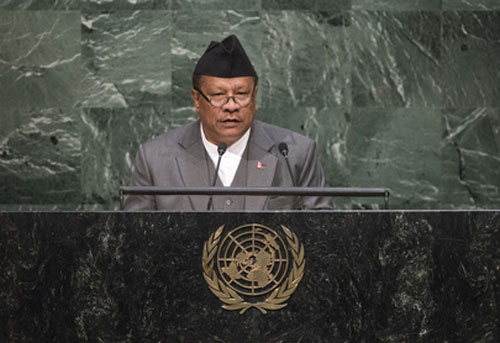New constitution guarantees fundamental rights of citizens, says DPM Singh
NEW YORK: Deputy Prime Minister Prakash Man Singh said that the new constitution promulgated in Nepal has guaranteed the fundamental rights of the citizens and has ambitiously broadened the rights of women, children, elderly and differently able persons as well as marginalised communities.
Addressing the 70th session of UNGA today, DPM Singh said that Nepal promulgated an inclusive democratic constitution on September 20 after about eight years of rigorous democratic exercise conducted in an inclusive, transparent and participatory manner.
Singh said that the new constitution has opened up new avenues of empowerment, progress and wellbeing for all disadvantaged groups including women, Tharus, Madhesis, indigenous people, Muslims and Dalits.
"The promulgation of constitution endorsed by over 90 percent membership of the 601-member strong Constituent Assembly marks the logical conclusion of the peace process as well as the end of the protracted political transition in the country. It has institutionalised the federal democratic republican system of governance in Nepal," Singh said while addressing the UNGA.
The DPM was of the view that the constitution exemplifies the victory of peace and non-violence as inspired by the teachings of Lord Buddha and reflects the best of democratic principles, norms and values befitting a country of vast diversity that holds centuries of social harmony and tolerance.
Likewise, DPM Singh also appreciated to the neighbouring countries for their humanitarian support and solidarity in the aftermath of the devastating earthquakes that struck Nepal in April and May this year. "We consider the global outpouring of support and solidarity to be an astonishing feat as well as a significant clue to the vast scope and potential of the spirit of the UN. Nepal looks to continued support and solidarity in the phase of rehabilitation and reconstruction," he said.
Regarding the problems of the Landlocked Least Developed Countries (LLDCs), Singh said that there was a strong need for the effective implementation of the Vienna Programme of Action to make a difference in the lives of about 450 million people living in LLDCs. "The world needs to ensure the unhindered access to sea by the LLDCs for free movement of people and goods. We stress that the freedom of transit of LLDCs should not be constrained under any circumstances or pretext to disrupt the flow of goods and services. The freedom of transit of LLDCs must be fully and unconditionally adhered to by all transit countries."
Likewise, DPM Singh called for an enhanced level of international collaboration to conserve and promote the mountain ecosystems for the common benefits of all.
"Climate change has emerged as one of the greatest development challenges confronting us. For a least developed country like ours, it increases the cost of development and also compels them to bear disproportionate impacts. There is an urgent need to translate commitments into concrete actions based on the accepted principle of common but differentiated responsibilities, equity and respective capability. A binding international instrument in Paris later this year is a must," Singh argued.
Saying that migration has emerged as a mega-trend, Singh said that due recognition and priority should be given to the protection of their rights and dignity in view of the greater vulnerabilities of migrants.
Asserting that there was a need for a stronger United Nations that is capable of delivering results based on the wider respect for and observance of the principles of sovereignty, territorial integrity, political independence and non-interference as well as of preserving the universal values of peace, justice, equality, freedom and human dignity, DPM Singh added that the reforms of the United Nations were needed for strengthening and revitalising its work to better respond to the increasingly complex and profound challenges.
"The reforms should be for the promotion of good neighbourly relations; the reforms should contribute towards a smarter maintenance of international peace and security; the reforms should be for the stricter adherence to the principles and purposes of the Charter; the reforms should be to promote economic and social advancement of all peoples; the reforms should be to enhance the dignity of the peoples in a just international order," the leader of Nepalese delegation in the 70th session of the UNGA said.
Saying that Nepal has been consistently contributing to the UN peacekeeping for about six decades now, Singh stated that Nepal, as one of the leading troops contributing countries, remains steadfast in its commitment to maintaining international peace and security. He also called for a strong sense of safety and security of the peacekeepers for their confidence and efficiency and asked the leadership opportunities to the member countries commensurate with the contributions to make the best use of their experience and to enhance efficiency and inspire commitment.
"Given the longstanding contribution and experience both in the field and headquarters, Nepal has the ability and willingness to contribute from senior level leadership positions in the UN peace architecture," he said.
On the occasion, Singh said that Nepal fully aligns itself with the spirit of the UN and the international community in dealing with all threats to peace and security. "Terrorism is the biggest threat to peace, security, and development. It is shocking to see the emergence of several terrorist outfits including violent extremism and religious fundamentalism in different parts of the globe. We unequivocally condemn terrorism in all its forms and manifestations."
He also said that Nepal wishes to see the world without weapons and all resources spent on armament urgently diverted to the cause of development for meeting the pressing needs of the people.
Singh also lauded the adoption of the 2030 Agenda for Sustainable Development on the historic occasion of the 70th anniversary of the founding of the UN saying that it has generated optimism for a better future across the world. "The goals to be truly transformative must embrace everyone and must be implemented in their entirety with required resources," he added.






